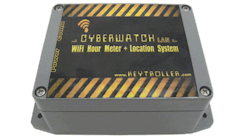"Metadata" is the latest buzzword to hatch in industry then migrate and morph in the pop culture world. The term is now in everybody’s vocabulary because word got out that Big Government is in league with Big Telecom (Verizon, et.al.) to pull phone transmissions out of thin air. Don’t worry that Big Brother is listening to your conversations. As Dianne Feinstein, chairman of the Senate Select Committee on Intelligence, assured the media, the government is only looking at metadata, not actual content of phone conversations. That means stuff like who called whom, when and from where.
If Big Brother were really smart, he’d drop that now politically-charged term and borrow another buzz phrase from industry: “Mobility Lifecycle Management.” I picked this one up from a conversation I had with Randy Martin last week. He’s Senior Manager, Global Services Product Management, at Motorola Solutions. They just announce a new device management service aimed at companies that want to use mobile devices to transform their business operations. Motorola has helped a number of enterprises, including UK Mail Group, to create mobile environments “that deliver results while reducing the operational risk associated with complex deployments and ongoing management,” their announcement read.
During our conversation, the news about our government digesting metadata was still fresh, so I asked Martin about whether businesses could use metadata from all these devices to better manage their people.
“Some customers have a sense that perhaps employees aren’t following policy with these devices,” he said. “One of our postal customers felt that the devices were being mistreated by the employees—that they might be throwing the devices in the back of their truck and while they drove around all day the devices was rolling around. We can pull data off those devices that gauge that kind of activity—that rolling around in the back of the truck. So they will come to us and ask us to pull that data off that device and overlay it with some of our processes. Then they ask us to tie that data to a device that’s tied to a user so we can take a look at return rates from a repair perspective and see if there’s a correlation.”
Martin says it’s not about Big Brotherism, but about enabling their business strategy. It’s also about moving to better route management, and more efficiency.
Another Motorola client had to improve their electronic proof of delivery capability. They recognized they had a higher return rate than they wanted and they wanted to improve POD usage adoption rates. They lacked visibility in terms of what devices had what on them. Within that context they wanted to employ this new technology.
That’s where mobility lifecycle management comes in.
“We built an architecture so we can track at a very detailed level the devices and their repair and usage history,” Martin said. “In partnering with the customer and with their data and ours, we can overlay the performance data with their business information, and they can get the kind of things to help improve their business.”
He doesn’t relate this to the government’s use of metadata, but as a way to help businesses improve their operations.
“What we’re doing today will enable more automated analytics as opposed to having subject matter experts looking at the data,” Martin concluded. “Analytics is about writing the logic that says, ‘Look at this condition plus this one.’ Operational recommendations can come from that.”
Operational metrics like battery management, device utilization, where the devices are located and what’s on them are all fair game for “mobility lifecycle management.”
Don’t be surprised if you hear Senator Feinstein using that terminology soon. It came up quite a bit in my phone call with Martin—that and other juicy, collectible metadata.




